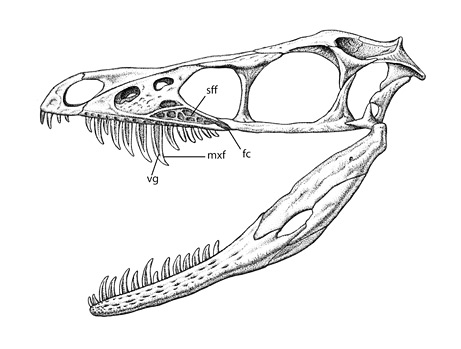Scientists discover dinosaur with venomous teeth
A team of Chinese and U.S. paleontologists have discovered a species of dinosaur, living some 125 million years ago in northeast China, could deliver poison via its fangs to help it hunt down its prey.
 Prof. Gong Enpu, of China's Northeastern University, who led the team, told Xinhua on Tuesday that the discovery held clues to how organisms have evolved to produce toxic substances.
Prof. Gong Enpu, of China's Northeastern University, who led the team, told Xinhua on Tuesday that the discovery held clues to how organisms have evolved to produce toxic substances.
Gong and his colleagues including paleontologist Larry Martin found that the dinosaur, Sinornithosaurus had unusually long grooved teeth on its upper jaw, similar to modern rear-fanged snakes and lizards.
They also found a place on the lateral surface of the dinosaur's upper jaw that could have housed a venom gland.
During their research, the length of the teeth puzzled Gong and his colleagues.
"The teeth are too long if the dinosaur just grabbed and swallowed its prey," Gong said. "... it seems not to have inserted its teeth deeply into its prey to kill it."
The paleontologists suggest the dinosaur had such long teeth to penetrate its prey's thick layer of feathers.
"The dinosaur probably fed on birds," Gong said. "Because the teeth were long enough to pierce through a bird's feathers and slice into the skin so the poison could enter the blood."
The venom was probably not deadly but stopped its prey from attacking or escaping, he said.
Sinornithosaurus is considered a close relative to birds. It was a relatively small dinosaur with a body no longer than a meter in length. The first fossil of it was found in 1996, giving fresh evidence to the theory that birds evolved from dinosaurs.
Gong's research was initially designed to trace the origin of bird's flying ability, but accidentally discovered the venomous teeth.
 0 Comments
0 Comments







Comments